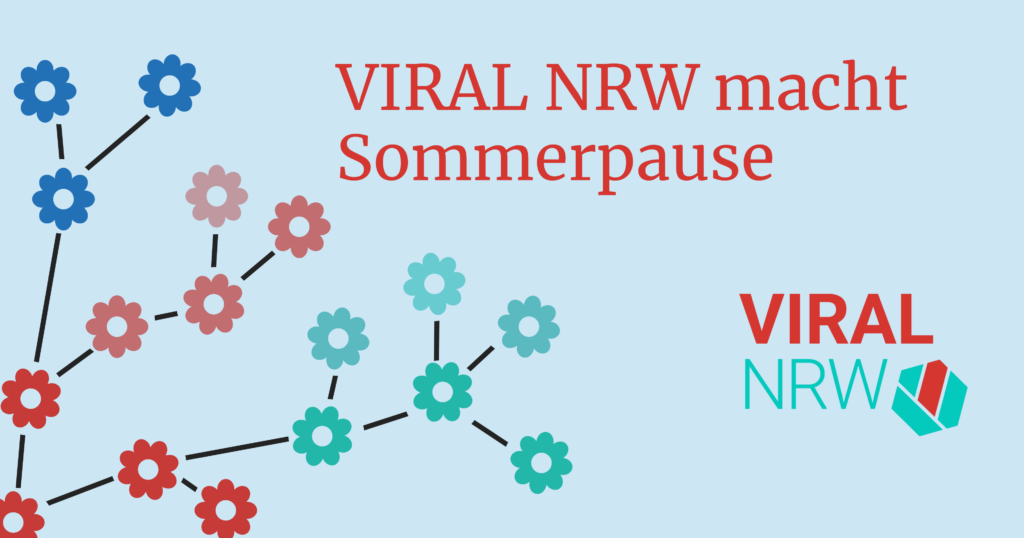Symposien

Hier finden Sie Informationen zu unseren aktuellen Veranstaltungen. Wenn Sie kostenlos an einer Veranstaltung teilnehmen wollen, melden Sie sich bitte hier an.
Save the Date:
Datum
27.09.2024
08.11.2024
Sprecher*in
Eric Snijder
Petr Chlanda
Archiv
Hier finden Sie Informationen zu unseren vergangenen VIRAL Symposien
18. Symposium (26.04.2024)
Marylyn Addo, Zentrum für Innere Medizin, Hamburg: Sex differences in immunity and vaccination
17. Symposium (08.03.2024)
Florian Krammer, Department of Microbiology, Icahn School of Medicine at Mount Sinai, New York: Development of broadly protective influenza virus vaccines
16. Symposium (23.02.2024)
Maria Rosenthal, Department of Virology; Bernhard Nocht Institute for Tropical Medicine, Hamburg: Bunyavirus genome replication and transcription – a structural perspective
15. Symposium (02.02.2024)
Anne Halenius, Institute of Virology; University hospital Freiburg: Cytomegalovirus US11 and MHC-A, engaged in a coevolutionary arms race in hominids
14. Symposium (17.11.2023)
Marco Binder, Research Group: Dynamics of early viral infection and the innate antiviral response; German Cancer Research Center; Heidelberg: Preparing the battle field – how cells remain vigilant against viral intruders
13. Symposium (20.10.2023)
Konstantin Sparrer, Institute of molecular virology, university hospital Ulm:The journey from pandemic to endemic so far – Functional impact of adaptations in non-Spike genes of SARS-CoV-2
12. Symposium (09.06.2023)
Sprecher:
Thomas Krey, Institute of Biochemistry, University of Lübeck: A new class of potent neutralizing human monoclonal antibodies targeting the Hepatitis E virus ORF2 protein
Volker Kinast, Medizinische Mikrobiologie und Virologie, Carl von Ossietzky Universität Oldenburg: Pro- and antiviral host factors of hepatitis E virus entry
11. Symposium (05.05.2023)
Sprecher*innen:
Gülsah Gabriel, Leibniz-Institut für Virologie (LIV), Hamburg: Sex differences in SARS-CoV-2 pathogenesis
Linda Brunotte, Westfälische Wilhelms-Universität, Münster: The ubiquitination landscape of the influenza A virus polymerase
10. Symposium (16.12.2022)
Sprecher*innen:
Denisa Bojkova, Institut für Medizinische Virologie, Universitätsklinikum Frankfurt: Monkeypox: Past, present and future
9. Symposium (30.09.2022)
Sprecher*innen:
William Palmer, Division of Biomedical Informatics and Personalized Medicine, University of Colorado, Aurora, USA: Human herpesvirus diversity is altered in HLA class I binding peptides
Adalbert Krawczyk, Clinic for Infectiology, Medical Research Center, University Hospital Essen, Herbal medicines and UV-radiation to combat SARS-CoV-2.
8. Symposium (16.09.2022)
Sprecher*innen:
Isabella Eckerle, Geneva Centre for Emerging Viral Diseases, Hôpitaux Universitaires de Genève, Université Geneva: Chasing the next SARS-CoV-2 variant and preparing for disease X.
7. Symposium (11.03.2022)
Sprecher*innen:
Kim Hasenkrug, Laboratory of Persistent Viral Diseases, Rocky Mountain Laboratories, National Institute of Allergy and Infectious Diseases, Hamilton (USA): Investigation of the role of T cells in SARS-CoV-2 infection of non-human primates.
Wiebke Moskorz, Institut für Virologie, Düsseldorf: NK cell immune modulation by SARS-CoV-2.
6. Symposium (11.02.2022)
Sprecher*innen:
Markus Hoffmann, Deutsches Primatenzentrum, Leibniz-Institut für Primatenforschung, Göttingen: Mutations in the spike protein of emerging SARS-CoV-2 variants affect cell tropism and neutralization sensitivity
Stephanie Pfänder, Abteilung für Molekulare und Medizinische Virologie, Bochum: Interfering with coronavirus infection – the role of type I IFN signaling for coronavirus immune control
5. Symposium (10.12.2021)
Sprecher*innen:
Jez Marston, Division of Infectious Diseases, New York: SARS-CoV-2 infection mediates differential expression of human endogenous retroviruses and long interspersed nuclear elements.
Sebastian Voigt, Institute for Virology, Essen: T cell responses in SARS-CoV-2 infections.
4. Symposium (19.11.2021)
Sprecher*innen:
Ludger Woessmann, ifo Zentrums für Bildungsökonomik, Ludwig-Maximilians-Universität München: The Legacy of Covid-19 in Education.
Felix Dewald, Institut für Virologie, Universität zu Köln: Lolli-Method to screen for SARS-CoV-2 Infection in Children.
3. Symposium (01.10.2021)
Sprecher*innen:
Nico Dragano, Institut für medizinische Soziologie, Universitätsklinikum Düsseldorf: Social determinants of COVID-19 (prevention, infection, disease severity): theory and empirical findings.
2. Symposium (27.08.2021)
Sprecher*innen:
Andreas Held, Fachgebiet Umweltchemie und Luftreinhaltung der TU Berlin: Aerosolprozesse und ihre Rolle bei der Übertragung von SARS-CoV-2.
Stephanie Pfänder, Abteilung für Molekulare und Medzinische Virologie, Universität Bochum: Stability and Inactivation of Corona viruses.
1. Symposium (25.06.2021)
Sprecher*innen:
Andreas Bergthaler, Research Center for Molecular Medicine of the Austrian Academy of Sciences Wien: SARS-CoV-2 evolution and immune evasion.
Ulf Dittmer, Institut für Virologie, Universität Duisburg-Essen: T cell responses in acute and recovered COVID-19 patients.
Möchten Sie Kontakt aufnehmen zu unseren Netzwerkpartnern? Kontaktieren Sie uns gerne!